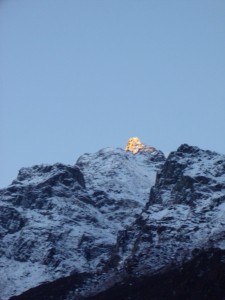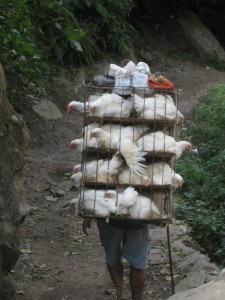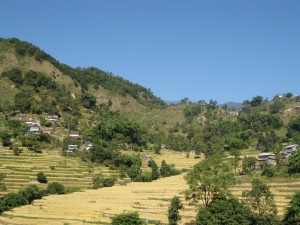Contributed by: Daniel Hofbauer | Last Date of Travel: November 2010
 Kosher Info:
Kosher Info:
The only kosher restaurant in Nepal is by the Chabad of Kathmandu (contact info below). They serve from late morning until the evening and the food is good. You can also cook yourself and just pay for ingredients. I was pleasantly surprised to find some kosher (OU certified) items such as Walkers Shortbread biscuits and Nature Valley granola bars in the supermarket.
Most people come to Nepal for the unbeatable trekking in the Himalayas. The most popular treks, Annapurna Circuit and Everest Base Camp take at least 10 days and potentially as long as 3 weeks. This brings unique challenges for the kosher traveler.
What to bring? Pretty much the same as any trek. A lightweight pot(s), a set (per person) of plastic traveling cutlery, bowl, cup & plate, brush to wash up with and a backpacking portable stove (the gas canister you can get in Kathmandu in one of the many trekking equipment stores). In terms of food, my main supplies were Quaker Instant Oatmeal (1 or 2 packets make a great breakfast), Osem Manot Chamot (instant meals like couscous, rice etc), granola / energy bars, loaf of bread (lasted me a week), crackers, peanut butter and more. For Shabbat on the trek, I recommend matzah (to make Kiddush/Hamotzi on) and, for a taste of meat, some kabanas which supposedly keep for a couple of weeks.
 When arriving at a village at the end of the trekking day, after checking out a lodge’s room, I would explain that I need to cook myself as I am a religious Jew and ask if this would be ok. Most places were fine with this, but some weren’t, in which case you move on to the next lodge. There is an unofficial “Israeli deal” (on the Annapurna Circuit trek at least) whereby Israelis try and get their room for free and pay for meals (where the lodge makes most of their money). I decided not to haggle and simply pay for lodging as I would need the lodge owner’s cooperation on the cooking front and they would be making less money from me, a kosher traveler.
When arriving at a village at the end of the trekking day, after checking out a lodge’s room, I would explain that I need to cook myself as I am a religious Jew and ask if this would be ok. Most places were fine with this, but some weren’t, in which case you move on to the next lodge. There is an unofficial “Israeli deal” (on the Annapurna Circuit trek at least) whereby Israelis try and get their room for free and pay for meals (where the lodge makes most of their money). I decided not to haggle and simply pay for lodging as I would need the lodge owner’s cooperation on the cooking front and they would be making less money from me, a kosher traveler.
For dinner I would either prepare an Osem instant meal or buy ingredients from the lodge. Given that dahl baht (rice and lentils) is the main stable in Nepal, you will find yourself eating a lot of rice. Bugs are very common so one needs to check the rice carefully. To avoid bishul akum while using the lodge’s stove, one needs to be involved in the process by either lighting the stove or mixing the rice intermittently, etc. (ask your local Rabbi if you prefer). I was warned by another kosher traveler to be respectful in their kitchen, as its their own private space they are letting you into. The kitchen can get hectic at meal time, so you may want to cook early before the rush. I recommend taking a camping stove – this way you are not dependent on anyone and have the option to cook in your room or outside, whatever and whenever you want. Also, with an instant meal you don’t have to spend the time checking rice – it may be the last thing you want to do after hiking 7 hours.
Tourist Info:
If you are traveling kosher and going on a trek for longer than a few days, I really recommend taking a porter. If it wasn’t for the food I wouldn’t have taken one but with 2 weeks of supplies, you can easily get to 20kg. Also, the trail isn’t always clear and a porter with experience will know exactly which way to turn. If you want to spend more, you can hire a porter-guide or certified guide. I arranged my porter, Nyma, through Swissa (see below) and he was great. Swissa knows all about kosher and Shabbat and can educate your porter before you leave. Having said that, Nyma would offer me some of his food every day so not sure if he quite got it…
 People recommended me to spend time in Kathmandu. Leave a cushion after your trek before your flight out and aim to spend 2-3 days in Kathmandu. But no need to spend too much time there – can get some good bargains there, but there are a lot of temples (read: avodah zara), and annoying street salespeople. Pokhera is meant to be nice and have a relaxed atmoshpere.
People recommended me to spend time in Kathmandu. Leave a cushion after your trek before your flight out and aim to spend 2-3 days in Kathmandu. But no need to spend too much time there – can get some good bargains there, but there are a lot of temples (read: avodah zara), and annoying street salespeople. Pokhera is meant to be nice and have a relaxed atmoshpere.
Swissa is the agency most of the Israelis use. They are really helpful, know their stuff and have the best prices (even for converting $ to Nepalese Rupees).
For buying or renting trekking gear, there are loads of stores in Thamel. I used Everest Trekking Store. The guy there gives special prices to Israelis (so brush up on your Hebrew) and speaks the lingo a bit (mechir tov…sababa egozim). Its hard to explain where he is but ask Swissa or call the store (+1 444 3708).
There is an international standard clinic/hospital in Kathmandu. Hopefully you won’t need but its good to know about it – CIWEC Travel Medical Center+977 1 442 4111 (opposite British Embassy, 5 mins cab from Thamel).
>> Other Tips….
If you do the Annapurna Circuit, you need a rest day for acclimatization at Manang. If you leave for the trek on Sunday, you can get to Manang by Friday and then rest on the real rest day.
For reading up before, besides Lonely Planet and Lametayel (for Hebrew speakers), Rob’s Nepal site has tips at the bottom of the page which are a great resource.
Make to sure to start vaccinations at least 3-4 weeks before travel and if flying via India, also sort out your visa early. I decided on my trip 3 weeks before and it was borderline. Visa for Nepal you get at the airport but you need passport pics. You can download the form ahead of time to beat the queue.
You can ask the agency you are using to get you TIMS and permit ahead of time for a small fee.
Make sure to have warm clothing (it is freezing up high) and the whole suite of medicines recommended (in the Lonely Planet book or wherever). Also, double check your travel insurance covers helicopter evacuation from the trek (just in case…you don’t want to be stuck with a $3,000 bill).
For places to stay in Kathmandu or Pokhara, check out TripAdvisor’s most recommended or if you are on a tight budget, ask people in Chabad for recommendations (you can pay as little as 300 NPR a night in Kathmandu…that’s $4)
Haggle…negotiate…hundel… – however you call it, do it….in most places.
Jewish Info:
The Chabad house is spacious and welcoming. They have meals & services on Shabbat and a restaurant during the week with a good choice including meat. Their Seder on Pesach is apparently the place to be in Asia. They have a good library of Jewish, Israeli and travel books as well as a collection of tips on Nepal and surrounding countries left by travelers. There are also classes during the week.
Chabad of Kathmandu: Rabbi Chezki & Chanie Lifshitz. Tel: (+977 1) 4701886 Mobile: (+977) 9803241294 Email: chabadnepal@hotmail.com. It is located in the Thamel area, opposite the Marshyangdi Hotel.



 Kathmandu, Nepal
Kathmandu, Nepal

as a kosher traveller, how much more money do you think i will need to spend in nepal than the average traveller?
In my recent experience traveling in Nepal, it is almost the same cost. Buying and cooking your own food is often much cheaper (just make sure you’re paying “Nepali” prices for your raw fruits and veggies – shop around or ask a local what things should cost). That you will pay a bit more for sleeping along trails evens out with how much you’ll save by not paying 200+rupees/meal at the lodges.
Check out http://www.travelingrabbi.com for more information and travel stories.
Great post! You have a lot of great information in here. You may be interested to learn that Chabad recently opened up in Pokhara and they have a restaurant there as well.
Please visit my site at http://travelingrabbi.com/countries/nepal/ and leave the information with a link to your site, too. I think my blog readers would really enjoy reading what you’ve said here.